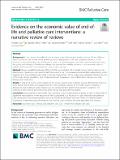Evidence on the economic value of end-of-life and palliative care interventions : a narrative review of reviews
Abstract
Background: As the demand for palliative care increases, more information is needed on how efficient different types of palliative care models are for providing care to dying patients and their caregivers. Evidence on the economic value of treatments and interventions is key to informing resource allocation and ultimately improving the quality and efficiency of healthcare delivery. We assessed the available evidence on the economic value of palliative and end-of-life care interventions across various settings. Methods: Reviews published between 2000 and 2019 were included. We included reviews that focused on cost-effectiveness, intervention costs and/or healthcare resource use. Two reviewers extracted data independently and in duplicate from the included studies. Data on the key characteristics of the studies were extracted, including the aim of the study, design, population, type of intervention and comparator, (cost-) effectiveness resource use, main findings and conclusions. Results: A total of 43 reviews were included in the analysis. Overall, most evidence on cost-effectiveness relates to home-based interventions and suggests that they offer substantial savings to the health system, including a decrease in total healthcare costs, resource use and improvement in patient and caregivers’ outcomes. The evidence of interventions delivered across other settings was generally inconsistent. Conclusions: Some palliative care models may contribute to dual improvement in quality of care via lower rates of aggressive medicalization in the last phase of life accompanied by a reduction in costs. Hospital-based palliative care interventions may improve patient outcomes, healthcare utilization and costs. There is a need for greater consistency in reporting outcome measures, the informal costs of caring, and costs associated with hospice.
Citation
Luta , X , Ottino , B , Hall , P , Bowden , J , Wee , B , Droney , J , Riley , J & Marti , J 2021 , ' Evidence on the economic value of end-of-life and palliative care interventions : a narrative review of reviews ' , BMC Palliative Care , vol. 20 , no. 1 , 89 . https://doi.org/10.1186/s12904-021-00782-7
Publication
BMC Palliative Care
Status
Peer reviewed
ISSN
1472-684XType
Journal item
Description
This work was supported by the Health Foundation (www.health.org.uk).Collections
Items in the St Andrews Research Repository are protected by copyright, with all rights reserved, unless otherwise indicated.

